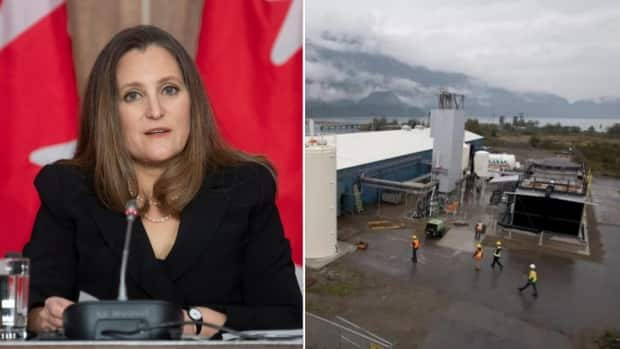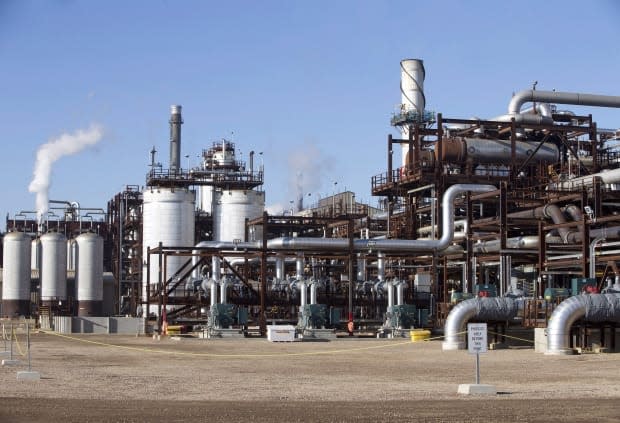When asked about emission targets, Freeland says carbon capture plans will 'turbocharge' industry

Deputy Prime Minister and Finance Minister Chrystia Freeland says measures proposed as part of last week's federal budget will help "turbocharge" work being done on carbon capture — and a law professor says that could be telling about the weeks and months to come.
Measures announced as part of the budget included a tax credit for carbon capture, along with $319 million over seven years for research and development.
On Sunday, CBC's chief political correspondent Rosemary Barton asked Freeland how to get buy-in from provinces like Alberta when it came to the federal government's new target for lowering greenhouse gas emissions.
"It's a good opportunity for me to point out to people across the country, our entire economy is reliant on the energy sector," Freeland said in an interview that aired Sunday on Rosemary Barton Live.
"The energy sector is such a big part of our GDP, it is a huge part of our exports, and it is very, very important for our current account balance."
Freeland went on to say that the budget introduced "really central measures" to help support the energy sector in driving down its emissions, including the carbon capture tax credit.
"That's going to be good for Alberta, it's going to be good for the energy sector, and I really look forward to working on that," Freeland said.
"I already have had some of the leaders of the Alberta energy sector get in touch with me since the budget came out to say they're looking forward to working on that, too."
A matter of emphasis
Kristen van de Biezenbos, an expert on energy law at the University of Calgary, said that instead of discussing emissions targets, Freeland may have been emphasizing a detail from the recent Supreme Court of Canada ruling on the carbon tax.
"When [the court] was discussing the issue of the carbon tax, one of the reasons why they seemed more comfortable with it as an exercise of federal jurisdiction, is that it leaves a lot of discretion up to the provinces," van de Biezenbos said.
Van de Biezenbos noted that all provinces need to do is meet the minimums of the backstop.
"There are a lot of different ways you can do that. So I suspect that [Freeland] wanted to keep the emphasis on supporting provinces, as opposed to telling the provinces exactly what they have to do," she said.
"Which isn't to say they're not going to do that at some point, but I think that she's still trying to keep the emphasis on working with provinces, as opposed to punishing provinces."

Freeland's emphasis on financial support for carbon capture and sequestration technology might represent a pill that is easier to swallow given its potential economic boost, van de Biezenbos said.
But some, including environmental groups, argue that support for carbon capture could delay a transition away from fossil fuels, allowing companies to essentially continue operating the way they are today while utilizing carbon capture and storage (CCS) technology.
"So, I think that's another message that the federal government is sending," van de Biezenbos said.
Even if the federal government is hoping for an aggressive transition to low carbon energy sources, van de Biezenbos said, emphasizing CCS sends another message.
"[It's] a way for the federal government to calm the fears of people within certain provinces that there's going to be an attempt to try to put certain industries out of business via the carbon tax."
An element of cooperation
Duane Bratt, a political science professor at Mount Royal University, said questions surrounding climate targets need to be posed to the prime minister and the environment minister.
"How are they going to achieve these targets without the cooperation of the provinces?" he said. "Especially Alberta, which has not just the highest per capita greenhouse gas emissions, but the highest overall greenhouse gas emissions in the country."
The budget did not provide the $30 billion sought by the Alberta government to explore CCUS technologies. Bratt said despite that, there were signs of co-operation emerging between the federal and provincial governments.
"Particularly since the carbon tax suit was decided by the Supreme Court, people are trying to move on and find areas of cooperation," he said. "So we could add carbon capture, we could add small modular reactors."
WATCH | Political scientist Duane Bratt discusses the evolving relationship between the federal and provincial government post-carbon tax ruling:
Bratt said there have been other signs of progress, like federal Natural Resources Minister Seamus O'Regan's stated positive relationship with Alberta Energy Minister Sonya Savage.
Bratt added that industry has been "ahead of both governments" on the matter of emissions.
"The big companies, the big companies that operate globally, or rely on global investment, I think they're very aware that they have to reduce their carbon footprint," he said.
The federal government plans to engage with stakeholders over the next 90 days on carbon capture tax incentives and said it will announce more details once that consultation is complete.
You can watch full episodes of Rosemary Barton Live on CBC Gem, the CBC's streaming service.

